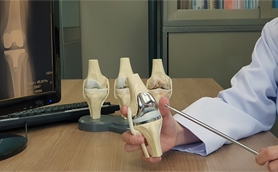Metal allergy or sensitivity is an immune response that reacts to metal molecules your body interacts with on a daily basis. Jewelry, eyeglasses, buttons on our clothing, or even cellphones can cause someone with a metal allergy to experience a rash, itching, swelling or redness.
Sometimes people are concerned about a metal allergy when they are considering joint replacement. Implants are commonly composed of metals such as Nickel, Cobalt, Chromium, Molybdenum, Zirconium, and Titanium. Will an implant made of metal cause a negative reaction and lead to revision surgery or a failed joint implant?
Although joint replacement results in a low friction environment within the joint, it is possible that over time the implant can shed tiny metal particles. Metal allergy or sensitivity can occur when these particles lead to the formation of metal ions that react with proteins. This can cause an inflammatory response in the body. However, in an article published by the World Journal of Orthopedics, allergies against implant materials remain quite rare.
Some signs of a metal allergy or sensitivity after joint replacement are:
- Itching
- Skin rash
- Discoloration of the skin around the joint
- Joint Pain
- Swelling
- Stiffness
Diagnosing a metal allergy or sensitivity after joint replacement can be very difficult. Joint pain, swelling, and stiffness are symptoms of other complications and may not be related to an allergy. Metal allergy is diagnosed only after all other possibilities have been ruled out.
Metal allergy is a very rare cause of implant failure in joint replacement. However, if you suspect that you have a metal allergy or sensitivity, let me know. We can discuss options for ensuring success for your joint replacement.
Dr. Paul Jacob is a leading hip and knee surgeon in Oklahoma City who pioneered robotic joint replacement surgery in an outpatient setting. Dr. Jacob has performed over 5000 robotic joint replacement procedures and actively participates in numerous research studies on robotic outcomes.













